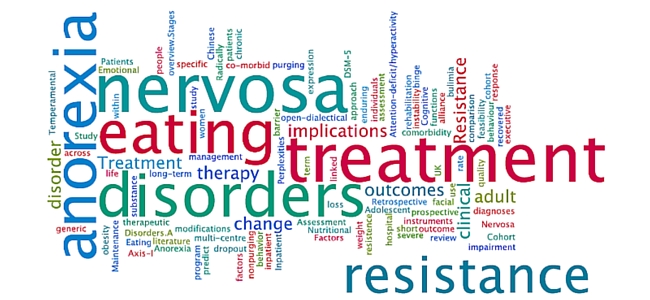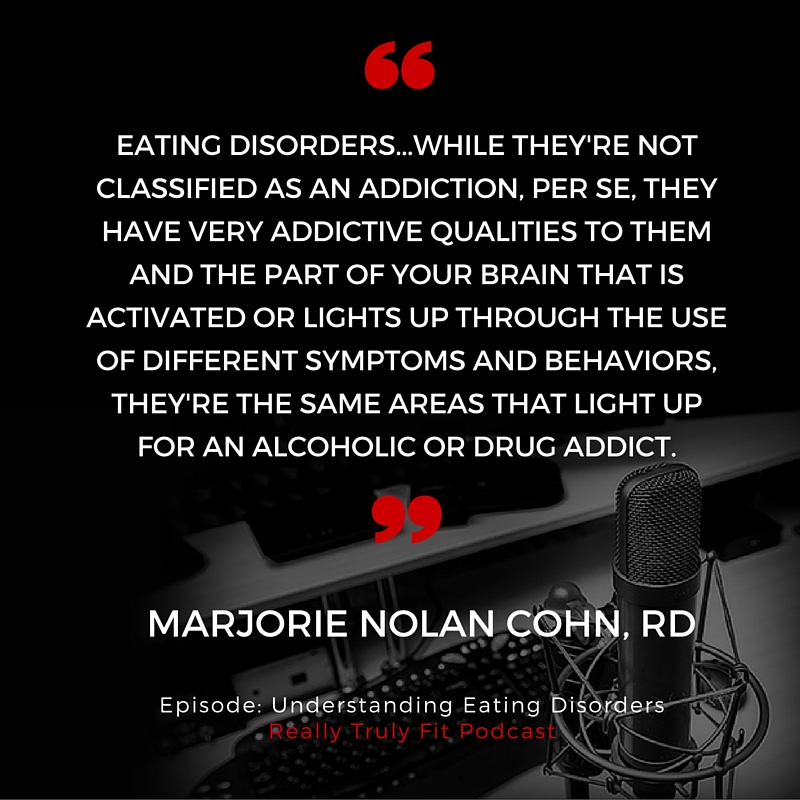Understanding eating disorders can be a difficult feat as they are among the most frustrating and difficult-to-treat conditions anyone can face. Did you know that up to 30 million people of all demographics suffer from an eating disorder in the United States and has the highest mortality rate of any mental illness(1). This is MAJOR.
Have you or someone you know experienced obsessive eating habits? Do you exercise 2-4 hours per day every day and get severely anxious when you miss a work out? Or maybe you have an obsession with perfect eating habits or perhaps even suffer from anorexia or bulimia? To help us shed light on this sensitive topic we’ve reached out to leading expert in our latest Really, Truly Fit podcast, Marjorie Nolan Cohn. Marjorie is the owner and founder of MNC Nutrition in New York City, a National Spokesperson for the Academy of Nutrition & Dietetics, Board Certified Sports Dietitian, Certified Eating Disorder Registered Dietitian and two-time published author. Tune in to learn more about about eating disorders and check out some key points below.
What is an eating disorder? According to the National Association of Anorexia Nervosa and Associated Disorders, an eating disorder is “an unhealthy relationship with food and weight that interferes with many areas of a person’s life. One’s thoughts become preoccupied with food, weight or exercise. A person who struggles with an eating disorder can have unrealistic self-critical thoughts about body image, and his or her eating habits may begin to disrupt normal body functions and affect daily activities.”
Three Main Types of Eating Disorders
- Anorexia Nervosa – characterized by self-starvation and excessive weight loss
- Bulimia Nervosa – characterized by a cycle of bingeing and compensatory behaviors such as self-induced vomiting designed to undo or compensate for the effects of binge eating. (2)
- Binge Eating Disorder – characterized by recurrent episodes of eating large quantities of food and regularly using unhealthy compensatory measures (like purging) to counter the binge eating.
But how about these other types of disordered eating that may not be a clinical classification but is becoming more prevalent?
Orthorexia – an obsession with eating healthy.
If you feel like you or someone you know may be suffering from orthorexia, ask the following questions:
- Do you wish that occasionally you could just eat and not worry about the food quality?
- Do you ever wish you could spend less time on food and more time living and loving?
- Do find that love, joy, play and creativity take a back seat in order to follow the perfect diet?
- Do you feel guilt or self-loathing when you stray from your diet?
- Do you feel in control when you stick to the “correct” diet?
- Have you put yourself on a nutritional pedestal and wonder how others can possibly eat the foods they eat?
Anorexia Athletica (hypergymnasia) – excessive and compulsive exercise.
- Do you feel that your exercise may be excessive?
- Do you have an obsessive behaviour with calories, fat, and weight?
- Do you feel that your self-worth is based on physical performance?
- Has your enjoyment of sports diminished or completely gone?
- Do you often find yourself defending or denying that over exercising is a problem?
Body Dysmorphia – a skewed perception of one’s body
- Are you worried about how you look?
- Is your main concern with how you look that you aren’t thin enough or that you might get too fat?
- How has this problem with how you look affected your life?
- On an average day, how much time do you usually spend thinking about how you look?
If you or someone you know may be suffering from an eating disorder, please seek professional assistance. Consult with a Registered Dietitian in your area or contact an Eating Disorders Help Line.
Sources:
(1) https://www.anad.org/get-information/about-eating-disorders/eating-disorders-statistics/
(2) https://www.nationaleatingdisorders.org/


